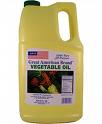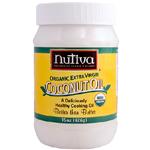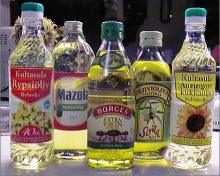| Share |  |
 | |||
Healthy Cooking Tips - Using Healthful Oils
 It is important to make wise choices in the types of fats we use in various kinds of cooking and food preparation. They need to be of high natural quality and free of properties detrimental to health. All fats, including cooking oils, are a mixture of saturated, monounsaturated, and polyunsaturated fatty acids--they are merely identified by the type of fatty acid that is predominant. Every fatty acid plays an important role in our bodies and a proper balance of each is essential to health. Here are some examples of different combinations of fatty acids in a variety of oils used in cooking:
It is important to make wise choices in the types of fats we use in various kinds of cooking and food preparation. They need to be of high natural quality and free of properties detrimental to health. All fats, including cooking oils, are a mixture of saturated, monounsaturated, and polyunsaturated fatty acids--they are merely identified by the type of fatty acid that is predominant. Every fatty acid plays an important role in our bodies and a proper balance of each is essential to health. Here are some examples of different combinations of fatty acids in a variety of oils used in cooking:
As you can see, there is no such thing as a saturated fat-free oil or one that contains only polyunsaturated or monounsaturated fat. One clue to the fatty acid make-up of an oil is its consistency at room temperature. Vegetable oils, high in polyunsaturated fats with little saturated fat, are liquid at room temperature. Those oils high in saturated fats such as coconut oil and butter are solid at room temperature. Monosaturated oils tend to be liquid at room temperature and partially solid at refrigerated temperatures.
| Type of Oil or Fat | Saturated | Monounsaturated | Polyunsaturated |
| Butter | 66% | 30% | 4% |
| Canola Oil | 6% | 62% | 32% |
| Coconut Oil | 92% | 6% | 2% |
| Olive Oil - Virgin | 14% | 73% | 11% |
| Safflower Oil | 10% | 13% | 77% |
| Sunflower Oil | 11% | 20% | 69% |
Heat's Effect on Oil
Each oil or solid fat has its own "smoke point," indicating how much heat the oil can take before its chemical structure begins to break down. As oils decompose, chemical changes occur that not only reduce flavor and nutritional value but also produce toxic lipid peroxides and release health-damaging free radicals. The more unsaturated a fat is, the more prone it is to be altered by these free radicals that cause oxidation and make the oil rancid. Polyunsaturated fats are naturally unstable and susceptible to heat damage due to their multiple carbon bonds that so easily break apart when heated. And the more it is heated, the worse the oxidative damage becomes. The most commonly used vegetable oils high in polyunsaturated fats are corn, soy, safflower and sunflower oils.
Polyunsaturated oils are refined to raise their smoke point and make them more stable for high temperature cooking. They are also refined to extend shelf life and remove impurities although flavor and any nutritive value of the oil source are filtered out in the process. The smoke point is raised at the cost of destroying antioxidants and natural preservatives in the oil that were meant to protect the body from free radicals. Not to worry - these valuable nutrients are replaced with BHA and BHT, chemical additive "anti-oxidants" to prevent fats from turning rancid too quickly (additives, by the way, found to have caused cancer and interfere with liver function in animal studies).
 Types of Processing
Types of Processing
Here are some of the steps that occur in the high heat chemical refining process of most vegetable oils purchased in grocery stores and used in the majority of processed foods:
- Seeds are heated and pressed to expose the oil
- Neutralization process using sodium hydroxide (found in Drano) to eliminate free fatty acids
- Oil is combined with chemical solvents like hexane (petroleum product) for extraction
- High heat exposure used to evaporate solvent (though residue remains)
- Degumming process occurs which removes most of the nutrients from the oil
- Decolorization or bleaching process occurs using high heat
- Oil is deodorized at temperatures over 500 degrees for 30 minutes to an hour

What is left is a clear, odorless liquid with chemical residues, void of taste and nutritional benefits. A healthier alternative is expeller pressing which is a chemical-free process in which the nut or seed is compressed to force the oil out mechanically using hydraulic action to crush the seeds. More delicate oils are "cold-pressed" using controlled cooler temperatures during processing since even mechanical pressing can generate a certain amount of heat. All cold pressed oils are expeller pressed oils. If you don't see "expeller pressed" or "cold pressed" on label, you know that it is solvent extracted. Expeller pressed oils are generally more expensive since the method only yields fifty to seventy per cent of the oil, but the end result is more nutritious without the oxidative damage from free radicals generated by high heat. The flavor and color of these more natural full-bodied oils will be more pronounced than their refined counterparts and the smoke point much lower. Because of their more delicate nature, unrefined polyunsaturated oils are best used unheated in things like salad dressings.
 Preferably, oils should be organic as well since pesticides, generally fat-soluble, are sprayed on plants these oils come from and are concentrated in the oil portion of the plant. Cottonseed oil and all products containing it should especially be avoided due to very high levels of pesticides used with cotton crops. Oils labeled "vegetable oil" or "all purpose" vegetable oil usually have inexpensive, highly processed oils, such as cottonseed oil in them and should also be avoided. And, of course, never use any type of margarine, shortening or other hydrogenated or partially hydrogenated oil or fat to cook with as they all contain trans fats or will easily form trans fats when heated.
Preferably, oils should be organic as well since pesticides, generally fat-soluble, are sprayed on plants these oils come from and are concentrated in the oil portion of the plant. Cottonseed oil and all products containing it should especially be avoided due to very high levels of pesticides used with cotton crops. Oils labeled "vegetable oil" or "all purpose" vegetable oil usually have inexpensive, highly processed oils, such as cottonseed oil in them and should also be avoided. And, of course, never use any type of margarine, shortening or other hydrogenated or partially hydrogenated oil or fat to cook with as they all contain trans fats or will easily form trans fats when heated.
What's Really Best for Cooking?
As much as polyunsaturated vegetable oils have been portrayed as the healthier alternative to saturated fats such as butter and coconut oil, primarily used in cooking many decades ago, there has been a growing consensus among health proponents, based on scientific research and studies, that excess Omega 6 vegetable oils actually contribute to many of today's health problems (see next month's article on "Understanding Fats - Part Two" for more detailed information on these findings). Suffice it to say that these vegetable oils, high in long chained polyunsaturated fats, should be used as little as possible as they are largely responsible for the unhealthy ratio between Omega 6 and Omega 3 essential fatty acids in the diets of most Americans today.
 That being said, what oils are the healthiest for use in cooking? Certainly unrefined monosaturated oils such as olive oil can be a healthy choice for certain kinds of cooking as long as right temperature guidelines are followed for the type used. They are relatively stable and do not go rancid easily. They also do not contribute as much to the Omega 6 and Omega 3 ratio imbalance. Olive oil, canola oil and other types of monosaturated oils, will be covered in next month-s "Healthy Cooking Tips" article.
That being said, what oils are the healthiest for use in cooking? Certainly unrefined monosaturated oils such as olive oil can be a healthy choice for certain kinds of cooking as long as right temperature guidelines are followed for the type used. They are relatively stable and do not go rancid easily. They also do not contribute as much to the Omega 6 and Omega 3 ratio imbalance. Olive oil, canola oil and other types of monosaturated oils, will be covered in next month-s "Healthy Cooking Tips" article.
Recommended Alternatives for Cooking
Despite it being engrained in people's minds that all saturated fats are bad and cause heart disease, there actually is a lot of scientific evidence and studies to the contrary. Many certified nutritionists and health advocates now support the health-promoting advantages of cooking with fats such as virgin coconut oil, organic butter and ghee (clarified butter). The biggest reason is that saturated fats are highly stable with a molecular structure that won't easily break down with heat exposure. This advantage makes them less prone to the production of trans fats, carcinogenic compounds or oxidative damage from rancidity and free radical activity.
 Virgin coconut oil is a natural, organic, coconut oil that is not refined, bleached or deodorized. It is derived from fresh coconut whereas unrefined coconut oil comes from copra or dried coconut meal and is not recommended. It is a medium chain fatty acid that digests easily for quick energy rather than being stored in fat cells. Medium chain fatty acids are transported directly to the liver, bypassing the complicated digestive process. This enables them to metabolize faster resulting in more calories burned and energy released. Dr. Asa Andrews, author of "Empowering Your Health" recommends the use of two tablespoons of extra virgin coconut oil daily to stimulate the metabolism and to increase thyroid function as well as for its anti-fungal and other health benefits.
Virgin coconut oil is a natural, organic, coconut oil that is not refined, bleached or deodorized. It is derived from fresh coconut whereas unrefined coconut oil comes from copra or dried coconut meal and is not recommended. It is a medium chain fatty acid that digests easily for quick energy rather than being stored in fat cells. Medium chain fatty acids are transported directly to the liver, bypassing the complicated digestive process. This enables them to metabolize faster resulting in more calories burned and energy released. Dr. Asa Andrews, author of "Empowering Your Health" recommends the use of two tablespoons of extra virgin coconut oil daily to stimulate the metabolism and to increase thyroid function as well as for its anti-fungal and other health benefits.
Coconut oil is solid at cooler temperatures and should be stored in a cool, dark place but should be refrigerated if room temperature is over 75 degrees. Its smoke point is 350 degrees. Unrefined virgin coconut oil is the only kind that should be used.
Butter is a mixture of fats, milk solids and moisture. It is primarily a saturated fat though its caloric value is less than oil. Ghee or clarified butter has no milk solids and its smoke point ranges from 375-485 degrees depending on purity whereas butter's smoke point is lower at 350 degrees. Butter is rich in short and medium chain fatty acids that are easily burned for fuel and have many of the same health properties as coconut oil. In addition, it is particularly recognized for containing CLA (Conjugated Linoleic Acid), which maintains optimal function of cell membranes, helping nutrients entering muscle cells to produce energy rather than accumulate as fat. CLA is also regarded to have strong anti-tumor and anti-cancer properties. CLA cannot be produced in the human body and is found in beef and dairy fats. Dairy cattle that are grass fed (vs. receiving feed) produce higher amounts of CLA in their milk so it is best to use butter that is organic.
 Care and Storage of Oil
Care and Storage of Oil
Oils should be purchased in smaller quantities and kept protected from exposure to oxygen, light, and heat. They should be stored in a cool, dark place and, once opened, in the refrigerator to prevent oxidation and rancidity. If oil becomes cloudy or thick, it will return to its normal clear state when brought to room temperature. Remember that the healthier the oil, the more quickly it may spoil so treat oil and your health with care.
Copyright © 2008-2015 Lucinda Bedogne, CNHP, CNC
Post Your Comment...
|
|
||||||||||||


